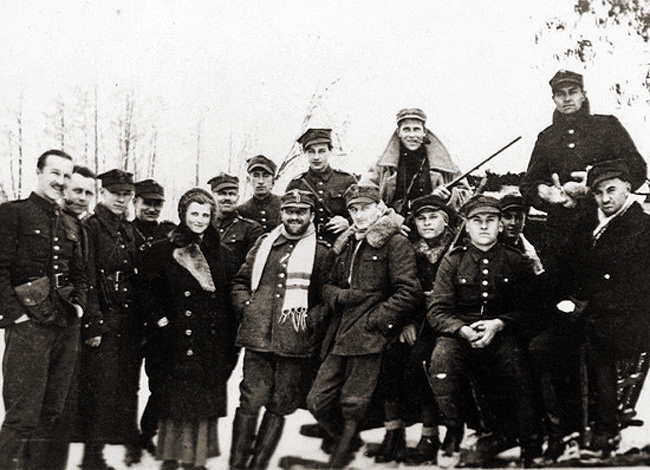Henryk Dobrzański lived and served in the Polish army according to the motto: “I will not lay down my arms, I will not take off my uniform. So help me God.” Henryk Dobrzański, aka Major Hubal, was taken by surprise and killed by the Germans on 30 April 1940.
by Piotr Bejrowski
He was born on 22 June 1897 to an aristocratic family possessing one of the oldest Polish pedigrees (coats of arms) – the Leliwa, which dates back to the 12th Century. According to some heraldry experts, Henryk Dobrzański was a descendant of the famous knight, Zawisza Czarny of Garbów, still recognized in Polish tradition as a model of chivalrous virtues: courageous on the battlefield and never foresworn.
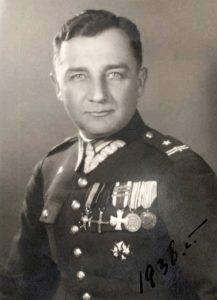
Dobrzański falsified his date of birth in order to be able to serve in the Polish Legions established following the outbreak of the First World War. After the country regained its independence, Dobrzański decided to remain in the army. He took part in the defense of Lwów, and then, after the outbreak of the Polish-Bolshevik war, he participated in many battles of the Kiev offensive. He had the courage to fight on the battlefield, as well as a talent for command, for which he received the highest civilian awards. When the longed-for peace came, he indulged in what he loved most – horse riding. He was an excellent rider, receiving numerous awards during national and international equestrian competitions. Sports successes also contributed to his advancement: in 1927 Dobrzański was promoted to the rank of major. The following year, he even took part in the Olympic Games in Amsterdam as a reserve. Poland obtained two equestrian medals – the silver and bronze.
After the outbreak of the Second World War, Dobrzański found himself in the east of the country. There, he received news of the Soviet invasion of Poland. He fought several battles against the Red Army, refused to surrender even after the Soviet had gained the military advantage, and, together with several dozen of his subordinates, decided to come to the rescue of Warsaw. After the capitulation of Warsaw, he initially planned to go through Hungary to France. However, every day the situation in Poland was becoming more and more dramatic.
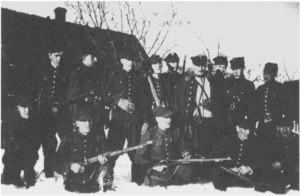
The regular Polish Army fought its last battle of the September campaign from 2 October to 6 October 1939. The battle between the units of the Independent Operational Group “Polesie” and the almost twice as large German XIV Panzer Corps ended in a tactical victory for the Poles. However, it was impossible to continue, so the commander, General Franciszek Kleeberg, decided to surrender. Although the battle formally ended the campaign, it did not end Polish resistance to the German invader. The Poles began organizing a resistance movement and established an underground army.
At the end of September 1939, Major Dobrzański decided to stay in the country and establish a military formation called the Separated Branch of the Polish Army. He then adopted the nickname “Hubal”, which is the nickname of the Dobrzański family. Hubal’s soldiers enjoyed the support of civilians who were comforted to see men in uniforms. The Germans recognized his bravery and courage and thus called him the “Crazy Major.”
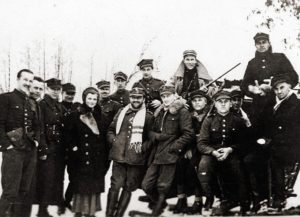
The command of the underground Union of Armed Struggle (the predecessor of the Home Army) was against Hubal continuing his partisan fight for fear of repression against civilians. The major did not comply with these orders. During several skirmishes with German police, Wehrmacht and SS divisions, the “hubals” – as the Major’s subordinates called themselves – seriously damaged the opposing forces. In retaliation, however, the Germans committed numerous crimes against civilians. This was the case with a battle which took place in March 1940 near the village of Hucisko in the Kielce region. A nearly hundred-strong unit of “hubals” managed to fend off the attack and smash the several-times-larger forces of the German police, inflicting serious damage (there were about a hundred killed and wounded Germans). After the defeat, the occupiers carried out an extensive repression, as a result of which, by mid-April 1940, 712 people had been murdered, including women and children, hundreds of houses destroyed, and several villages burned down. Dobrzański survived and blamed himself for the death of these innocent people. Despite this, he did not decide to lay down his arms, but only avoided contact with the local population so as not to expose them to further repression.
On 30 April 1940, Hubal’s army unit was caught unaware by the Wehrmacht near the village of Anielin near Opoczno. During the battle, Henryk Dobrzański was killed by machine guns. The German soldiers massacred his body and exposed him to the public as a warning to the local people. To this day, it is not known where they buried his body.
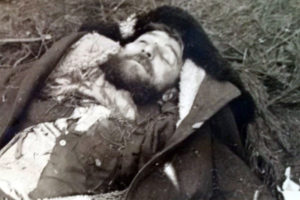
In a message about the death of the major, Hubal was described as follows: “A man who loved his Polish army uniform above all else since he’d first put it on in 1914, without taking it off even once…was buried in it (…). The man who died without breaking his oath, he never brought shame and saved the Honor of the Polish Soldier “. After his death, his soldiers pledged to continue fighting for a free Poland.
Author: Piotr Bejrowski
Translation: Alicja Rose & Jessica Sirotin

